#grand duchess olga nikolaevna(the elder)
Explore tagged Tumblr posts
Text
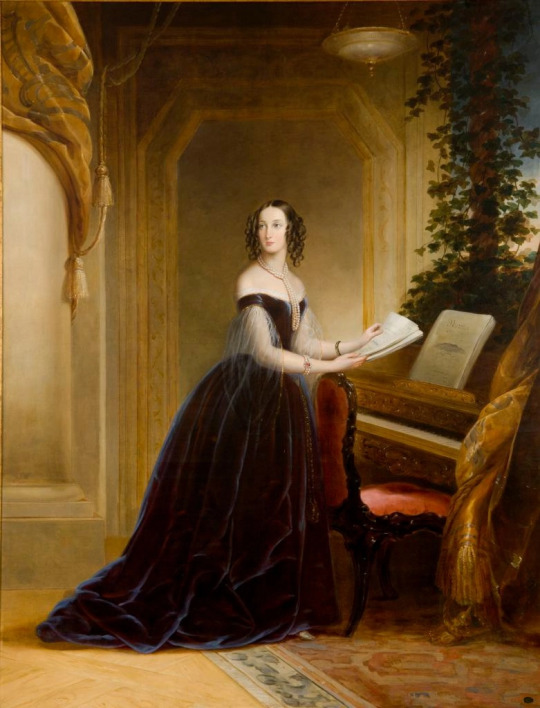

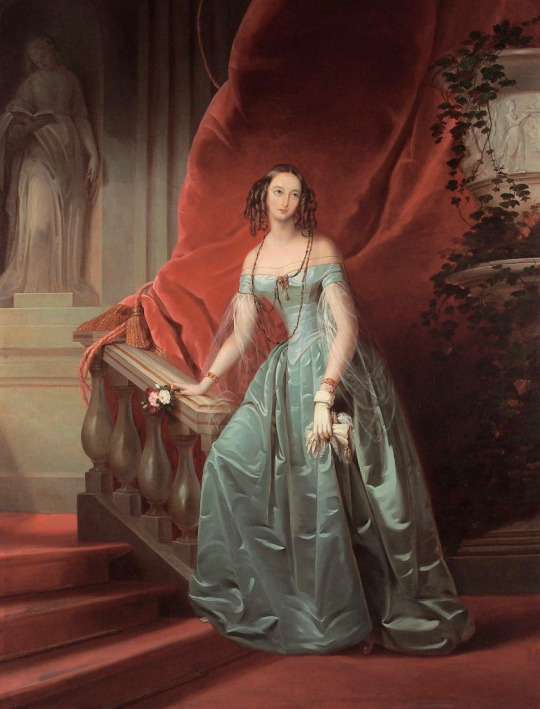
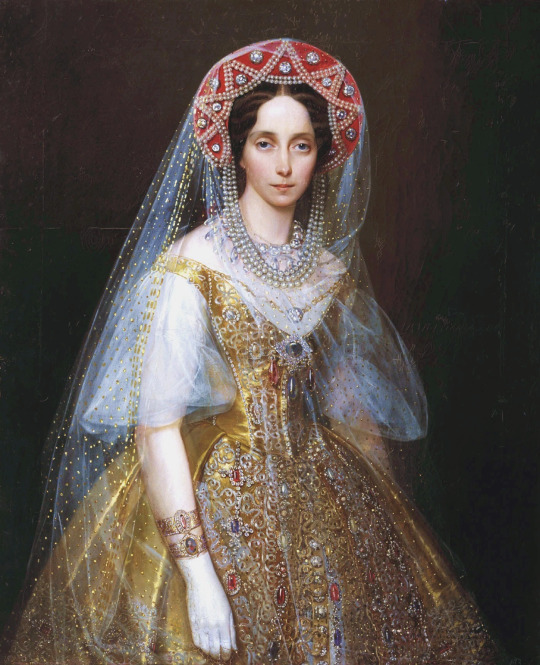
“Whenever I see the Empress among the public, I have the impression that she is immeasurably far away in soul, that she has nothing in common with this motley secular crowd that gathers around her. Her sisters-in-law, Grand Duchesses Maria Nikolaevna, Olga Nikolaevna and Alexandra Iosifovna, make a completely different impression. They shine with beauty, their facial features are more regular than those of the Empress, their posture is perhaps more regal, but the Empress has much more charm, a charm that comes from the soul and is difficult to define, but making one’s innermost soul-strings sound.”
- Anna Tyutcheva on Empress Maria Alexandrovna of Russia.
#anna tyutcheva#empress maria alexandrovna#grand duchess maria nikolaevna the elder#grand duchess olga nikolaevna the elder#grand duchess alexandra iosifovna#romanov#russia#quotes
106 notes
·
View notes
Text


Empress Maria Alexandrovna of Russia, ~ Wife of Tsar Alexander II ~ Grandmother of Tsar Nicholas II ~
“Marie won the hearts of all those Russians who could get to know her. Sasha [Tsar Alexander Il] became more attached to her every day, feeling that his choice fell on God-given. Their mutual trust grew as they recognized each other. Papa [Tsar Nicholas I] always began his letters to her with the words: "Blessed be Thy Name, Mary." Dad joyfully watched the manifestation of the strength of this young character and admired Marie's self-control. This, in his opinion, balanced the lack of Sasha's lack of energy from which he constantly worried about.” - Grand Duchess Olga Nikolaevna (the elder)
"I thought her very ladylike, kind and amiable. We were at ease at once, but she has a sad expression and looks so delicate. I think we should get on very well together, poor thing. I pity her much." - Queen Victoria
“The first time I set eyes on the Grand Duchess, she was already twenty-eight years old, but still looked very young. She retained that youthful appearance all her life; when she was forty, she could have been taken for a woman of thirty. Although she was tall and slender, the Empress was so thin and fragile that at first glance she gave no impression of a 'belle dame'. However, she was unusually elegant, with that special kind of grace only found in old German paintings…Although her facial features were regular, her beauty lay in the delicate color of her skin and her large blue eyes, which looked at you with both perception and timidity... She seemed almost out of place and uneasy in her role as mother, wife, and empress. She was tenderly attached to her family and conscientiously fulfilled the duties which her exalted rank demanded. Her mind was like her soul: refined, subtle, penetrating and extremely ironic, but lacking in breadth and initiative.” - Anna Tyutcheva, maid of honor to Maria Alexandrovna
#maria alexandrovna#empress maria alexandrovna#russian imperial family#russian history#personality post#Tsarina Maria Alexandrovna#imperial russia#tsar Alexander II#quotes#queen Victoria#olga nikolaevna#grand duchess Olga nikolaevna (the elder)#Anna tyutcheva#romanov#Romanovs#Maria Alexandrovna quotes#Russia#1800s
29 notes
·
View notes
Text

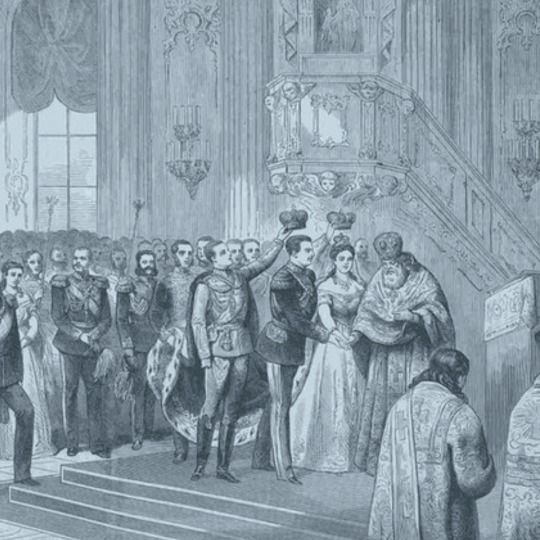
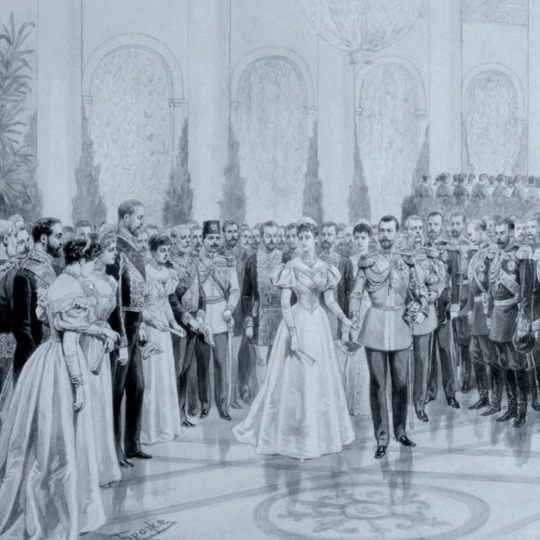

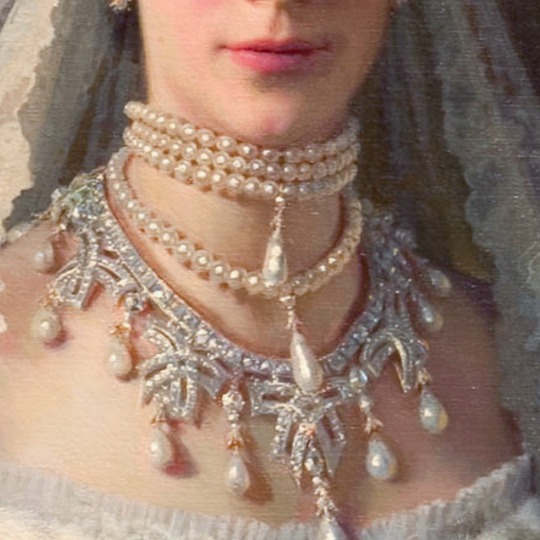
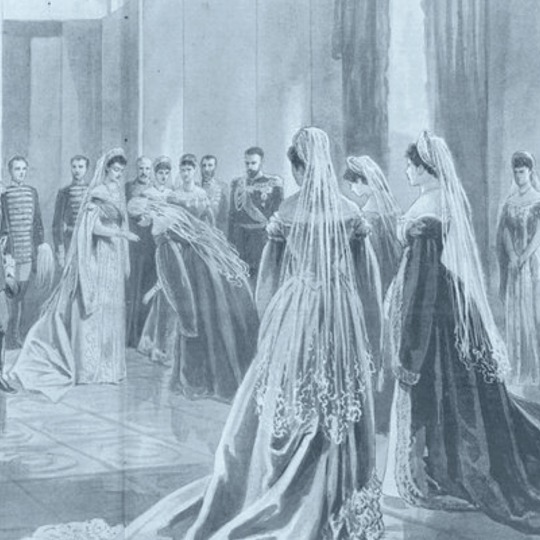
💌 “We must expect anything, even a disaster. All I ask of Russia is to hold fast. She will hold. Don't doubt it!” - Grand Duchess Marie Pavlovna (Miechen) to Maurice Paléologue
💌 “It seems that all are mad... I am absolutely depressed. All that happened is so terrible... My God, what awaits us and what will that end with?” - Marie Feodorovna, in a message to Xenia, after the Archduke's assasination, 1914
#grand duchess vladimir#maria pavlovna the elder#otma#romanov#romanov family#the romanovs#tsar nicholas ii#alexandra feodorovna#maria feodorovna#anastasia nikolaevna#olga nikolaevna#maria nikolaevna#tatiana nikolaevna#alexander iii#imperial russia
100 notes
·
View notes
Text
Adini🥺💔




The first Nicholas and Alexandra and the three graces
Before Nicky and Alix and OTMAA, there was Nicholas I (who was said to be not only the Iron Tsar but also the best-looking man in Europe) and his wife, Empress Alexandra Feodorovna (Princess Charlotte of Prussia or "Muffy" as he called her.)
The couple had seven children, four sons and three daughters. Their sons (Tsar Alexander II and Grand Dukes Konstantin Nicholaevich, Nicholas Nicholaevich, and Mikhail Nicholaevich) are better known than their daughters, even though they were said to be not only beautiful but exceptional in intelligence and education.
Nicholas and Alexandra's eldest daughter was Grand Duchess Maria Nicholaevna, who would become the Duchess of Leuchtenberg through marriage. I have read that Maria's face resembled her father's and that she would dare argue with him, and when she did, their countenances would terrify those around them. She is described as energetic and willful. She was an art connoisseur and collector.
The second daughter was Grand Duchess Olga Nicholaevna, who became the Queen Consort of Wurttemberg. She was elegant, stately, kind, intelligent, and educated. She did many good works in her adopted land and was beloved by her people.
The third daughter was Alexandra, better known as Adidini. While the two older daughters resemble their father, Adini is said to have resembled her mother. She was interested in nature and music, in particular singing. Her story is very sad. She died young and, in doing so, broke her father's heart.
These women deserve more than three lines...so you will be hearing more about them. As far as I know, there is no picture of Adini, so I have included a painted portrait instead.
#tsar nicholas i#duchess of leuchtenberg#empress alexandra feodorovna(the elder)#grand duchess maria nikolaevna(the elder)#duchess of leuchentberg#grand duchess olga nikolaevna(the elder)#queen olga of württemberg#grand duchess alexandra nikolaevna#grand duke konstantin nikolaevich#grand duke nicholas nikolaevich#grand duke mikhail nikolaevich#informational
27 notes
·
View notes
Text

Romanov relatives: Theodora of Greece & Berthold of Baden.
Both Romanov descendants, Theodora was the granddaughter of Grand Duchess Olga Konstantinovna and one of the elder sisters of Prince Philip, Duke of Edinburgh; Berthold was the great-grandson of Grand Duchess Maria Nikolaevna, daughter of Nicholas I. They are pictured here with their children Margarita and Max.
#romanov relatives#greek royal family#theodora of greece#berthold of baden#margarita of baden#max andreas of baden#my collection
27 notes
·
View notes
Note
Hi! Can you give us a huge insight of Tatiana Nikolaevna's personality? I would be interested in some rare quotes said by someone who met her! (cos she is my favorite royal like ever and I'm hopeless obsessed with her 😫)
Hello! Of course, here are some of my favourite rarer quotes about Tatiana - or from Tatiana herself - which I think give a great insight into her personality....

"Tatiana Nicolaievna had holly different… character. Less serious than her elder sister she was also more positive. In her could already be discerned a strong tendency to dominate to impose her authority coquette. She saw and noticed everything, and often made observations to her sisters, who because of it nicknamed her ‘the governess'… she took great care of her appearance and was it was said that she resembled her…”She's already a woman," said the Empress about her that year. She was the favourite in the family. She was very superstitious. One day she wrote to a graphologist, a fortune teller, to ask that she inform her about the destiny in store for her. By an intermediary, the other had sent to her a note couch in these terms: "A fatal destiny awaits you" Thereafter, the Grand Duchess never stopped bombarding her tutor, Petrov with questions such as "What does that mean? How am I to interpret this letter?"" - Alexander Spiridovich, Last Years as Tsarskoe Selo, volume 2
"It was Tatiana Nicholaievna who would call N.P. Sabline by telephone to transmit ‘Papa’s’ order to come with his friends to play tennis." - Alexander Spiridovich, Last Years as Tsarskoe Selo, volume 2
"As for poor Alexei Nikolaevich, he was as if rooted to the armchair the whole time [unwell]. It was touching to see his sister, Tatiana Nicholaievna, lavishing attention on him before the luncheon." - Alexander Spiridovich, Last Years as Tsarskoe Selo, volume 2
"In [Alexandra's] eyes, as well as in those of her sister, Tatiana Nicholalevna, all that was Russian was superior to all the rest. To try, even jokingly, to lower something Russian in favour of something foreign was to expose oneself to losing her sympathy forever." - Alexander Spiridovich, Last Years as Tsarskoe Selo, volume 2
"Russian was taught by Peter Vassilievitch Petrov, whom I had had myself as a teacher at the Pavlovskoe military school. Petrov was already an elderly man, very gentle, and very good hearted. He held the Tsar's children in affection and they, in turn, were attached to him as if to a kindly relative. Often, when they were alone with him, the Grand Duchesses used to play with him, shouting, laughing, pushing him, and generally hauling him about without mercy. It was Tatiana Nicholaievna, graceful and agile as a gazelle, who would always give the signal on these occasions and direct the games. She was, at that time, a very pale little girl. One day, Petrov asked Olga Nicholaievna to name a white object for him.
My blouse, replied the Grand Duchess.
And a black object?
My slate pencil.
And a green one?
My sister Tatiana.
That really was the tint of her complexion." - Alexander Spiridovich, Last Years as Tsarskoe Selo, volume 1
"[Alexandra] herself taught them sewing and needlework, her best pupil being Tatiana, who had an extraordinary talent for all kinds of handwork. She not only made beautiful blouses and other garments, embroideries and crochets, but she was able on occasions to arrange her mother’s long hair, and to dress her as well as a professional maid." - Anna Vyrubova, Memories of the Russian Court
"Suddenly [whilst watching a cinematograph] the bigger girl [in the movie] snatched a toy from the little one who, however, held on to it and refused to give it up. Foiled in her attempts, the elder seized a spoon and pounded the little one with it, who quickly relinquished the toy and began to cry. Tatiana wept to see the poor little one so ill-treated, but Olga was very quiet." - Margaretta Eagar, Six Years at the Russian Court
"One of the under-nurses was married last year. She had come to the palace straight from her school, at seventeen years of age, and was there for nearly seven years. She was naturally very much attached to the children, and when her last day came was in floods of tears all through the day, and the children were terribly distressed to see her in such grief. The little Grand Duchess Tatiana told her she could stay on if she liked, she knew we all loved her and would be sorry to part from her ; and then she came running to me to beg me not to send dear Tegla away. I answered that she might stay if she liked, but that she had promised to marry Vladislav ; it was her own wish, and I did not think she would like to break her word. The other girls gave a little party to celebrate her leaving us, and the young man was amongst the guests. When the girl heard that he had arrived her grief broke forth again. She realised that the time of parting had come, and the children cried most bitterly. Little Tatiana Nicolaivna took a sheet of paper and a pencil, and wrote with great difficulty a letter which I translate : " Vladislav, Be good with Tegla. Tatiana." She placed this letter in an envelope and printed in large letters on the envelope, Vladislav, and sent it to him by the housemaid. I went in later to speak to the man and wish him happiness. He pulled this letter out of his pocket, and with tears in his eyes begged me to thank the little Grand Duchess, and assure her that he would never forget to be good to Tegla. All the more, because it was Tatiana Nicolaivna' s wish. He always carries the letter about with him. She came to visit us several times after her marriage and was very happy. Whenever she writes she always sends a special message to Tatiana to say that Vladislav is very good to her, and the little one looks so pleased and says, " Well, I am glad."" - Margaretta Eagar, Six Years at the Russian Court
"After coffee, I went for a walk with my pupils… They really liked to go to the shops and buy everything. Anastasia Nikolaevna was especially attracted to stored, where they sold doll shoes of various sizes… Tatiana Nikolaevna did not always accompany since the doctors found her heart was weak and she went with the Empress to take baths." - Sofia Ivanovna Tyutcheva, A Few Years Before the Catastrophe
"Alexandra's 594th letter to Nicholas, Sept 19 1916: …I do so want to get quicker well again, have more work to do & all lies upon Tatiana’s shoulders." - Joseph T. Fuhrmann, Nicholas and Alexandra: The Wartime Correspondence
The following are from Correspondence of the Russian Grand Duchesses: Letters of the Daughters of the Last Tsar by George Hawkins:
Tatiana to tutor PVP - 10 July 1906 - "Dear Petr Vasilievich! …Why did you write that I was not good? You mustn’t do that, you must write that I was a very good girl. Your devoted Naughty girl, Tatiana." -
Tatiana to PVP November 6th 1909 "…On these few lines I had 10 errors… I am so ashamed when I think about it"
Pierre Gilliard to Tatiana 25 May 1916 - "...It seems that purple is his [Dmitri Pavlovich] favourite colour… Alexis Nikolaevitch says that it is also yours…"
Letter from Alexandra to her brother and sister-in-law: 2 September 1911 …[after Stolypin's assassination] Tatiana came home very tearful and is still a little shaken whereas Olga put on a brave face throughout." - The Correspondence Of The Empress Alexandra Of Russia With Ernst Ludwig And Eleonore, Grand Duke And Duchess Of Hesse
Note from Anastasia to Tatiana - "1913 Aug. 4. My sweet Tatiana, please find out all about us and let us know through Shura about tomorrow, will we take off our caps for breakfast? Your Anastasia. Don’t forget." - Anastasia Romanov: The Tsar's Youngest Daughter Speaks Through Her Writings
Letter from Pierre Gilliard to Anastasia, Spring 1916: "…I already wrote a long letter to Tatiana Nikolaevna yesterday, but I don’t think I shall send it, otherwise I would not dare to go back to Tsarskoe Selo, I would fear for my life." - Anastasia Romanov: The Tsar's Youngest Daughter Speaks Through Her Writings
"4 December. ...The general atmosphere that lords over [us] nowadays does not inspire peace. As soon as dressings end, Tatiana Nikolaevna goes to do the injection, then sits down with K [officer]. The latter is constantly restless, first sits by the piano, playing something with one finger, chats a lot and fervently with the charming child. Varvara Afanasiyvna is appalled, what if Naryshkina walks in on this scene, Madame Zizi, she would die. Shakh-Bagov has fever, is in bed. Olga Nikolaevna sits by his bed constantly. The other couple also moved there, yesterday [they] sat by the bed and looked at a photo album. K. is being so coy. Tatiana Nikolaevna's small dear child's face cannot hide a thing, [it looks] pink, excited, Isn't this closeness, the physical contact harmful[?]. I feel scared. The others are jealous, angry, and I imagine they spread all sorts of [rumours] throughout the city and later beyond." - From the memoirs of V. I. Chebotareva
"Today Tatiana Nikolaevna walked with me upstairs after dressings, to do Popov’s dressing. The poor child is terribly embarrassed; grabs my hand: “So awfully embarrassing and frightening… one never knows whom to acknowledge and whom not to.”" - From the memoirs of V. I. Chebotareva, Sister of Mercy
"To the right of me sits the Grand Duchess Tatiana. She's a grand princess from head to toe, so aristocratic and regal. Her face is pale matte, only the cheeks are slightly rosy, as if pink satin is trying to escape from just under her thin skin. Her profile is flawlessly beautiful, as if cut from marble by a great artist. The widely set eyes provide uniqueness and originality to her face [...] The nurse's Red Cross kerchief is more flattering to her than to her sisters. She laughs more rarely than her sisters. Her face sometimes has a focused and stern expression. In those moments she looks like her mother. On the pale outlines of her face are traces of deep thoughts and sometimes even sadness. Without any words I feel that she is special, different from her sisters, despite their common traits of kindness and friendliness. I feel hers - is a wholly secluded and unique world." - From the memoirs of Sophia Ofrosimova, Sister of Mercy
The following are all from Tatiana Romanov, Daughter of the Last Tsar: Diaries and Letters, 1913–1918:
"9th June. Tuesday. Today our Mary [Vishnyakova] left us, our nanny who was with us for 16 years. She left because it is time for Aleksei to be transferred into male hands so she will not have anything to do here anymore, so she left. I feel so sorry for her."
"28 February 1916. Tsarskoe Selo. Dear Mama, Would you not want to try to put this piece of fur to your cheek? Olga . . . gave it to me when I too was suffering from headaches. It is from the grave of the orthodox Semyon Verkhotursky. Try it, maybe it will help you. If not, then return it to me tomorrow. I hope that the Lord will help you, and all will be well with you. May God bless you. 1000 kisses from your very own daughter, Tatiana."
"6 April. On Wednesday, I will have my dreary Committee, and even the thought of it makes me sweat. I do not like these horrible committees."
"22 September. My meeting is on Wednesday at 2 o’clock in the Winter Palace in Petrograd. And that knave, Neydgart —he wanted me to read something at the beginning of the committee [meeting], but darling Mama said there was no need. To think, [he wished that] I would read such idiotic, stupid things in front of 14 people! Ah!"
"13 December. I have the great pleasure to go to the Petrograd Committee today. Oh! Not wanting to [go] at all."
"...the dear children worked until the 8th hour. Tatiana Nikolaevna cut her finger with a scalpel, quite a lot of blood flowed, and although the blade was clean, perhaps dust might have ended up in the wound. Melik-Adamov and Shakh-Bagov were sitting nearby. What poetic sympathy Tatiana Nikolaevna brings! How warmly she responded when called to the telephone and was read the telegram about his injury. What a good, pure, and deep girl she is! Youth is attracted to youth, and how her eyes sparkle! Awfully nice!" - Memoirs of V. I. Chebotareva
"Before they left we kissed each other good-bye, and we all had a dim feeling that this was a crucial moment. We had been marched away separately at every previous change from boat to train, but this seemed to be different. Tatiana Nicolaevna tried to take the matter lightly. "What is the use of all these leave-takings? We shall all rejoice in each other's company in half an hour's time!"" - Sophie Buxhoeveden, Left Behind
"I was presented to the Emperor and to two of the young Grand Duchesses, Olga and Tatiana. The latter, to my idea, was the prettier of the two; but both had the simplicity of manner that is the greatest charm in every person and especially in anyone who holds such a position as theirs. They were not blasé in the least, and their faces shone with pleasure and excitement... The eldest, Olga, was very intelligent and gay and had a heart of gold; but she was also rather timid, so that her sister Tatiana, who was much more sociable, was easier to get on with at first." - Olga Voronva, Upheaval
"The Grand Duchess Tatiana was as charming as her sister Olga, but in a different way. She has been described as proud, but I never knew anyone less so. With her, as with her mother, shyness and reserve were accounted as pride, but, once you knew her and had gained her affection, this reserve disappeared, and the real Tatiana became apparent. She was a poetical creature, always yearning for the ideal, and dream- ing of great friendships which might be hers. The Emperor loved her devotedly, they had much in common, and the sisters used to laugh, and say that, if a favour were required, ''Tatiana must ask Papa to grant it." She was very tall, and excessively thin, with a cameo-like profile, deep blue eyes, and dark chestnut hair... a lovely "Rose" maiden, fragile and pure as a flower." - Lili Dehn, The Real Tsaritsa
"The Tsarevitch was a lively, amusing boy, with a wonderful ear for music, and he played well on the balalika : like Tatiana he was shy, but, once he knew and liked anyone, this shyness vanished." - Lili Dehn, The Real Tsaritsa
"October 24 - Today, Tatyana Nikolaevna first came alone: "After all, I'm going here, as if to my second home," and, indeed, she was so sweet and comfortable. She ran with me to the kitchen, where we prepared bandages. The empress laughed and said that Tatyana, like a good house dog, got used to it." - Diaries of Vera Chebotaryova
"In her physical appearance and her serious and ardent nature, she most resembled her mother. "She was also the family's manager and organizer, and possessed, more than her sisters, a highly developed sense of her position as the daughter of the Tsar." Tatiana was very different from Olga in temperament and interests. She was more confident of herself and more reserved, with more perseverance and balance. Slender, with auburn hair and clear gray eyes, she was strikingly good-looking and enjoyed the attention her beauty commanded. As the Empress became more and more an invalid, Tatiana, eighteen months younger than Olga, took over much of the responsibility for the younger children and the household. Had her life run its natural course, she would have graced many a ball." - The private world of the last Tsar, in the photographs and notes of General Count Alexander Grabbe
"Her Imperial Highness is President of the Committee for helping War-ravaged Russia, and is fully explained on the opposite page by M. Czerniewski. She is no mere figurehead, but takes the deepest and most constant interest in this splendid work." - British newspaper article
"Of the persons left behind [at Tobolsk] Tatischeff was the senior; and of the remaining part of the imperial family, Tatiana was considered senior in the place of the Grand Duchess Olga." - Examination of Sidney Gibbes, The Last Days of the Romanovs
"The Grand Duchess Tatiana Nicholaevna was very thin. You could hardly imagine anybody as thin as she was. She was twenty-one years of age, was tall, darker than the rest of the family, and elegant. The colour of her eyes was dark grey. Her eyes made her look different from all of her sisters, who showed their souls through their eyes. She was reserved, haughty, and not open hearted, but she was the most positive. She was also religious, but the motive back of her religion was: "It is my duty,' while Olga Nicholaevna had it in her heart. She was always preoccupied and pensive and it was impossible to guess her thoughts. She played the piano and played it better than anyone else in the family. However, she had only a better technique and did not show feeling in her music. She painted and embroidered well. She was her mother's favourite and the one in whom, of all the daughters, she confided the most. If any favours were to be obtained they had to be gotten through Tatiana Nicholaevna." - Examination of Sidney Gibbes, The Last Days of the Romanovs
The Grand Duchess Tatiana was about twenty. She was quite different from her sisters. You recognised in her the same features that were in her mother — the same nature and the same character. You felt that she was the daughter of an emperor. She had no liking for art. Maybe it would have been better for her had she been a man. When the emperor and empress left Tobolsk nobody would ever have thought that the Grand Duchess Olga was the senior of the remaining members of the imperial family. If any questions arose it was always Tatiana who was appealed to. She was nearer to her mother than the other children; and it seemed that she loved her mother more than her father... All of them, including Tatiana, were nice, modest and innocent girls. There is no doubt they were cleaner in their thoughts than the majority of girls nowadays." - Examination of Commissar E. S. Kobylinsky, The Last Days of the Romanovs
"Tatiana looked like the czaritza. She had the same serious and haughty look as her mother. The other daughters : Olga, Maria and Anastasia,* had no haughtiness about them. One had the impression that they were modest and kind. I also can not describe the way they dressed, as I did not notice it." - Examination of Commissar Yakimov, The Last Days of the Romanovs
"Two other commissaries went to Tobolsk to remove the remainder of the family — Tatiana had been left in charge of the invalid and household. Olga, the eldest daughter, did not enjoy her mother's confidence in the same degree. She took far more interest in literature than in the practical affairs of life, and would hide herself in a comer with a book or tell stories to the soldiers, utterly forgetting domestic trifles. Anastasia, still a child, and rather backward, could be left in Tatiana's care." - Narrative of the editor, The Last Days of the Romanovs
Happy reading! I hope this helped :)
#q#ask#answered#Tatiana Nikolaevna#Tatiana Romanov#sources#otma#history#russian history#imperial russia#romanov family#romanov sisters
91 notes
·
View notes
Text

Grand Duchess Anastasia “Shvybzik” Nikolaevna funnily being pushed off of a chair while her elder sister Grand Duchess Olga Nikolaevna watches on, Finland 1909-1910 🤍🤣✨
People in the background for whom I can identify: Anna Vyrubova, Nikolai Pavlovich Sablin, Pavel Voronov
#lmao 🤣🤣🤣#olga nikolaevna#anastasia nikolaevna#shvybzik#otma#romanov#romanovs#romanovs being funny#russian history#russian imperial family#anna vyrubova#pavel voronov#Nikolai Pavlovich sablin#1909#1910#finnish skerries
56 notes
·
View notes
Text
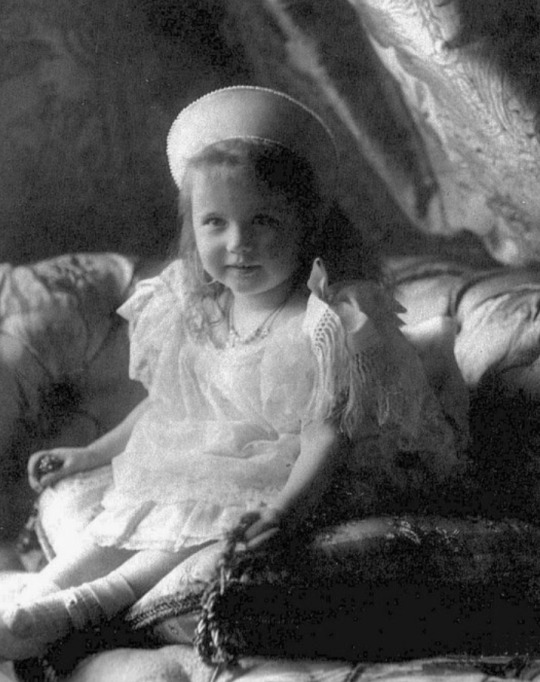
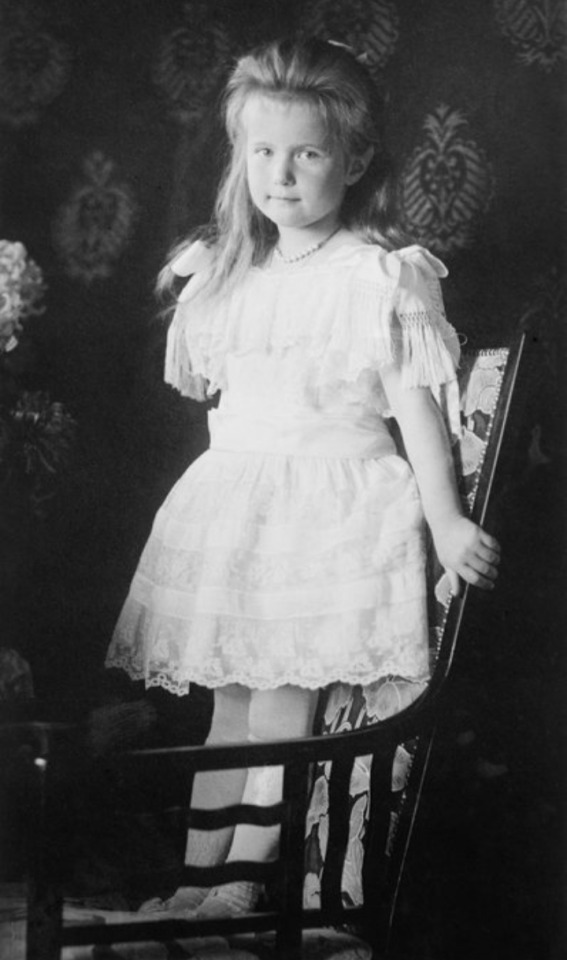
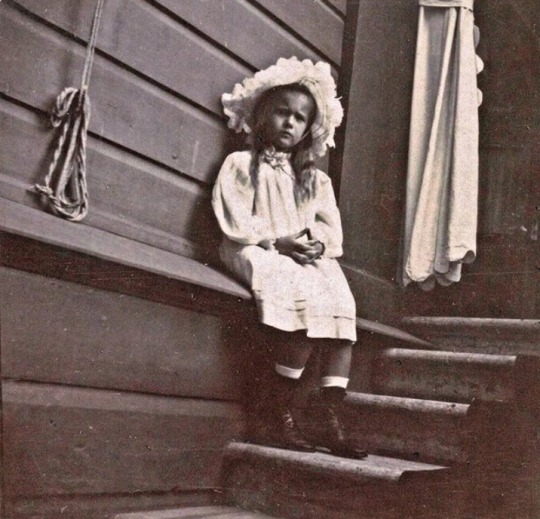
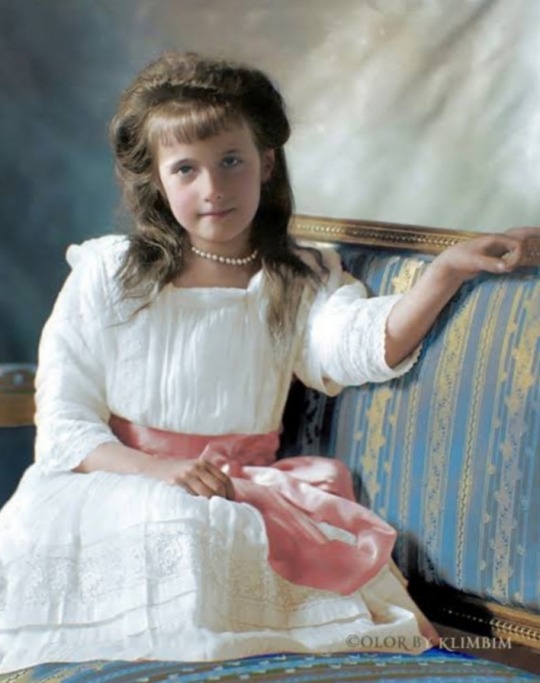
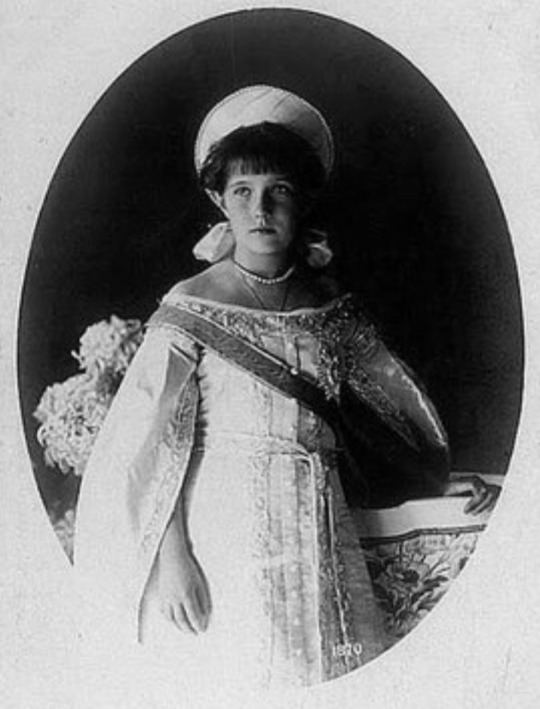
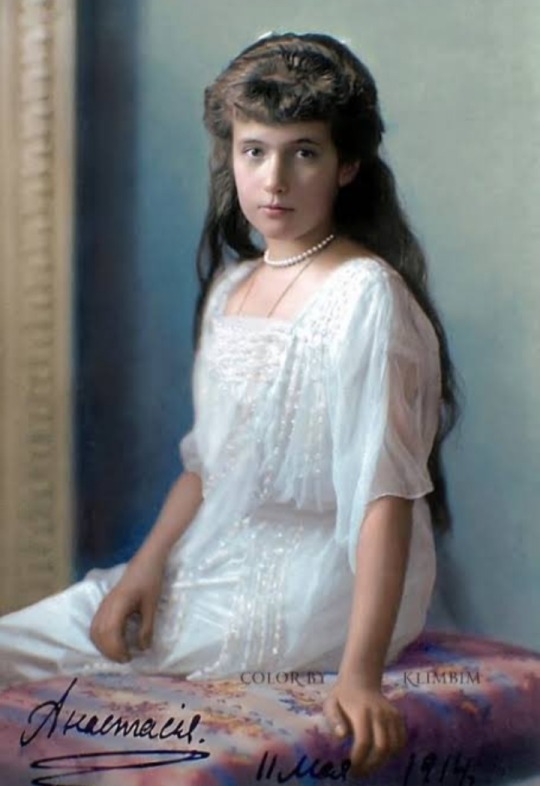
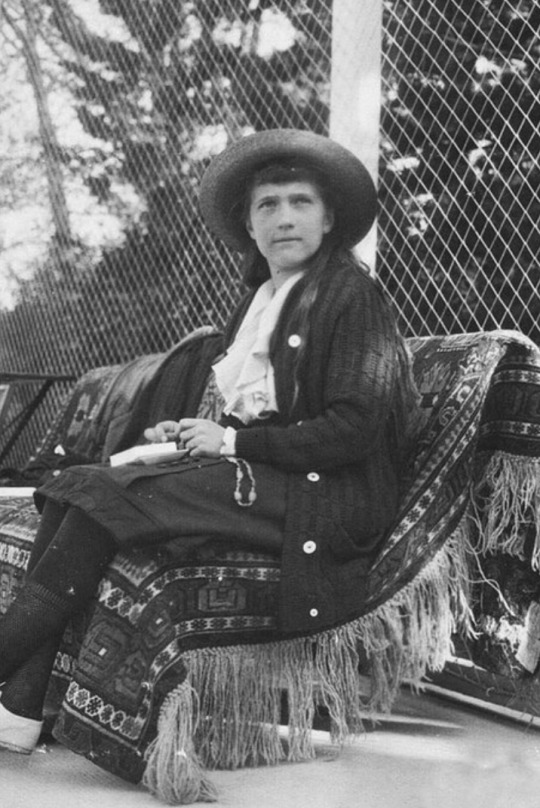
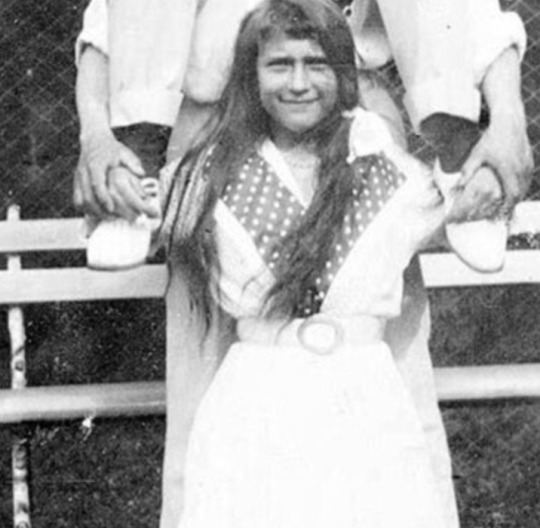
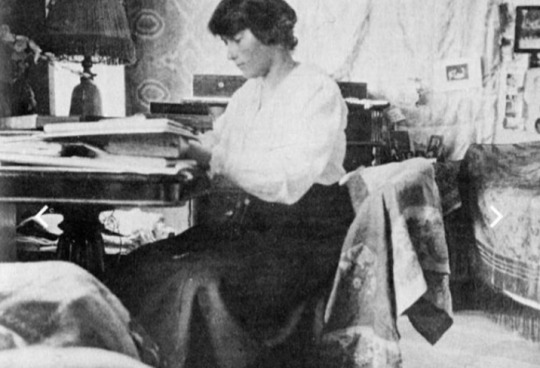
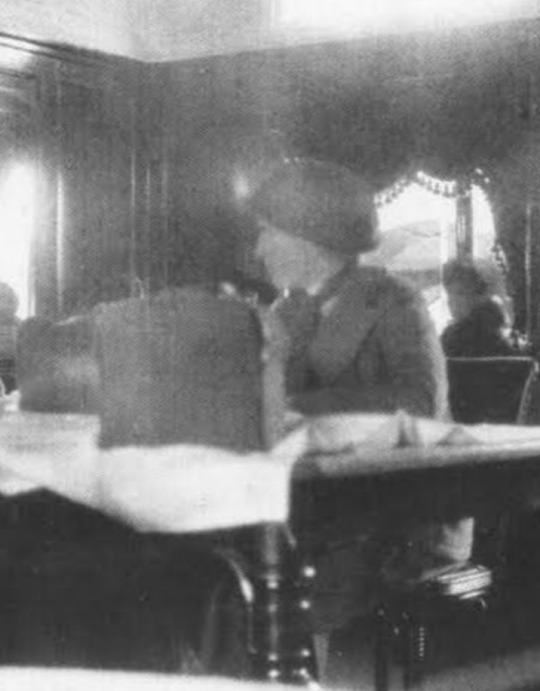
BORN ON THIS DAY:
Grand Duchess Anastasia Nikolaevna of Russia (18 June [O.S. 5 June] 1901 – 17 July 1918) was the youngest daughter of Tsar Nicholas II, the last sovereign of Imperial Russia, and his wife, Tsarina Alexandra Feodorovna.
Anastasia was the younger sister of Grand Duchesses Olga, Tatiana and Maria, and was the elder sister of Alexei Nikolaevich, Tsarevich of Russia.
She was killed with her family by a group of Bolsheviks in Yekaterinburg on 17 July 1918.
#Grand Duchess Anastasia Nikolaevna of Russia#House of Romanov#Russian Royal Family#Romanov Family#Romanov Dynasty
10 notes
·
View notes
Text
The Romanovs and the Zodiac
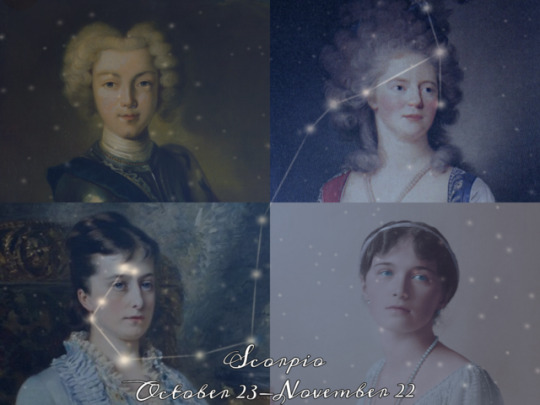
Scorpio
The eighth sign in the Zodiac, Scorpio is a water sign and a fixed negative sign. Scorpio used to be thought to be ruled by the planet Mars, but after the discovery of the planet Pluto in 1930, it became associated with Scorpio instead. Scorpio is associated with three animals; the snake, the eagle (the Phoenix) and most famously the scorpion. The snake and eagle are related to the nearby constellations of Ophiuchus and Aquila. Scorpio is also associated with the Greek deity Artemis, who is said to have created the constellation Scorpius. Scorpio's colours are deep red, maroon, brown, and black. Famous Romanovs born under the Scorpio include; Emperor Peter II (b. October 23, 1715), Empress Maria Feodorovna the Elder (b. October 25, 1759), Princess Catherine Yurievskaya (b. November 14, 1847), and Grand Duchess Olga Nikolaevna (b. November 15, 1895).
#peter ii#empress maria feodorovna the elder#princess catherine dolgorukova#princess catherine yurievskaya#grand duchess olga nikolaevna#olga nikolaevna#scorpio#the romanovs and the zodiac#house of romanov#imperial russia#russian history#russian empire#my edit
16 notes
·
View notes
Photo
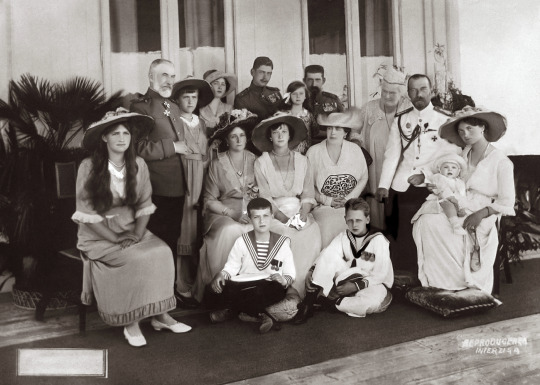
Of course, it was to be expected that as soon as the Tsar's daughters attained a marriageable age suitors in plenty would come forward. Indeed, gossip has already been very busy with their names, and when, just before the war broke out, the King of Saxony went to pay a visit to the Court of Petersburg, certain ignorant people declared that it was intention to propose himself as a husband for Olga Nikolaevna. It was forgotten that a Queen of Saxony must belong to the Roman Catholic faith, notwithstanding that most of the people over whom she reigns are mostly Protestants; and when the Roumanian Royal Family visited Tsarkoye Selo during the summer of 1914 there were bets going on in fashionable circles of Petersburg as to whether the son of the Crown Prince would become engaged to the elder or the younger of the two Grand Duchesses named.
However, no announcement followed upon this journey, which from another point of view was more memorable than the world knew, because it laid the foundation of a permanent understanding between Roumania and Russia. A few weeks later the Tsar, accompanied by the Empress and by his daughters, visited the King and Queen of Roumania at Constanza, and it was verbally arranged that Prince Carol, the eldest son of the Crown Prince, would pay another visit to Petersburg during the winter of 1914.
The war broke out, and all these plans came to nothing; but when peace is once more restored to the world it is probable that the subject of Roumanian marriage for one of the Tsar's daughters will be revived. A good many reasons speak in favour of such an event. The future Sovereign of Roumania, Prince Carol, belongs to the Greek Orthodox faith; he rules over a Slav population, which has long aspired to a closer union with Russia, that would make the marriage immensely popular all over the country.
The advent of a Russian Crown Princess would be received with enthusiasm and further consolidate a dynasty which is loved by the people, because the present Queen, by birth an English princess, is also a grandchild of the late Emperor Alexander II, and consequently has Russian blood in her veins. From a political point of view, considering the ambitions of King Ferdinand of Bulgaria in regard to the Balkans, it would have an immense political importance, for the independence of Roumania would thus remain assured by the certainty of the protection of Russia.
Speculation has been very active in suggesting which of the two – the Grand Duchess Olga or the Grand Duchess Tatiana – would consent to accept the diadem. It seems however, from all that one hears that it is the Grand Duchess Tatiana whose sympathies have been captured, and who also made the greater appeal to the feelings of Prince Carol. Her elder sister, the Grand Duchess Olga, declared when still quite a child that no consideration whatever would induce her to leave Russia. But time will tell. It was said at one time that both the Emperor and Empress would have liked her to become the wife of the Grand Duke Dmitri Pavlovitch, the only son of Grand Duke Paul and his first wife, the lovely Princess Alexandra of Greece; but lately it has been whispered that the idea has been abandoned and that probabilities point to one of the sons of the Grand Duke Constantine as a prospective son-in-law of the Tsar. It would not be an impossible thing, by any means, especially if one takes into consideration the very few bridegrooms who will be eligible in Europe after the war.
The Royal Marriage Market of Europe – Catherine Radziwill 1915
#Grand Duchess Tatiana Nikolaevna#Grand Duchess Olga Nikolaevna#Queen Marie of Romania#1910s#Carol II of Romania#nicholas ii#romanian royal family#russian royal family#gossip#romanov#King Ferdinand of Romania#Empress Alexandra Feodorovna
42 notes
·
View notes
Text



The three daughters of Emperor Nicholas I of Russia by P.F. Sokolov.
#grand duchess maria nikolaevna the elder#grand duchess olga nikolaevna the elder#grand duchess alexandra nikolaevna#romanov#russia#p.f. sokolov#portraits
57 notes
·
View notes
Text
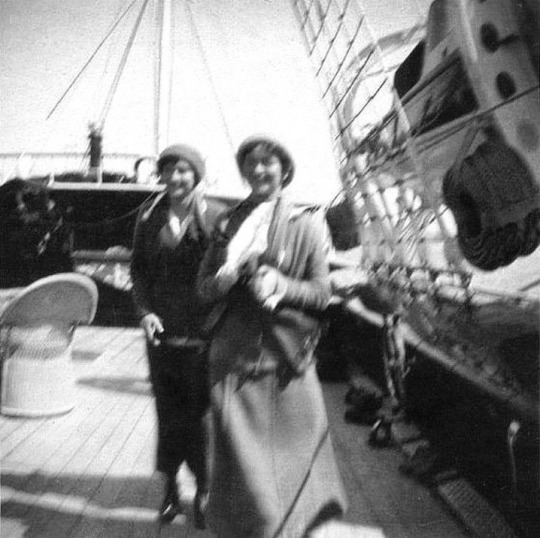
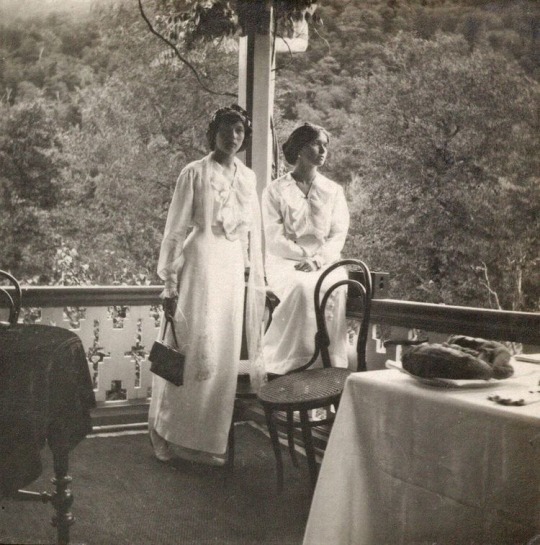
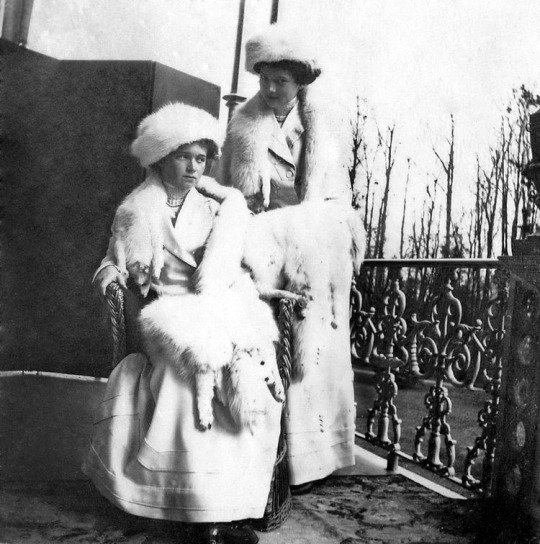
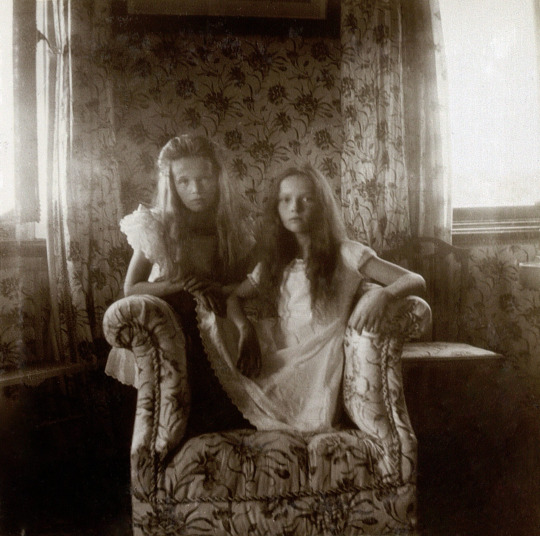
Happy Birthday Tatiana!
Grand Duchess Tatiana Nikolaevna, Olga’s younger sister, was born on June 10th, 1897 in Peterhof. She was the second child of the last Tsar of Russia, Nicholas II. He recorded in his diary: “The second bright happy day in our family: at 10:40 in the morning the Lord blessed us with a daughter - Tatiana. …Tatiana weighs 8 3/4 pounds and is 54 centimeters long. Our eldest is very funny with her.”
Growing up, Olga and Tatiana were known as the “big pair” to differentiate them from their two younger sisters, Maria and Anastasia, who were known as the “little pair.” The pairs would often be dressed in very similar clothing and shared a bedroom together in the Alexander Palace. While all of the sisters were very close to each other, especially as they matured, the pairs had more of a mutual understanding and trust with one another.
“[Olga’s] more careful sister, Tatiana, would suggest practical measures, would note names and details, and come back to the subject later out of a sense of duty. …[Tatiana] had a less strong character than Olga Nikolaevna, whose lead she would always follow, but she could make up her mind in an emergency quicker than her elder sister, and never lost her head. …[Tatiana] became much better known than her cleverer elder sister, as she took more trouble about the people she met.” -Baroness Sophie Buxhoeveden, lady-in-waiting to the girls’ mother, Empress Alexandra Feodorovna.
“Having friends was very important to [Tatiana], and like her sister Olga, she eagerly sought them out. …Unlike Olga, [Tatiana] never complained when asked to do a chore by her parents. …Imprisonment was tough on Tatiana. Like her older sister, she became even more thin and withdrawn. Tatiana was religious, much in the same way her mother was, and she was an inspiration to the rest of the family in captivity.”
Tatiana was a tremendous source of support for her family while they were in captivity. She assisted in taking care of her younger brother Alexei, who had suffered from a hemorrhage and was unable to walk, while they were left in Tobolsk without their parents. Tatiana and Olga were holding onto one another when they were killed on July 17th, 1918.
#history#russia#royalty#romanov#house of romanov#grand duchess olga nikolaevna#olga nikolaevna#grand duchess tatiana#tatiana nikolaevna#the big pair
82 notes
·
View notes
Text

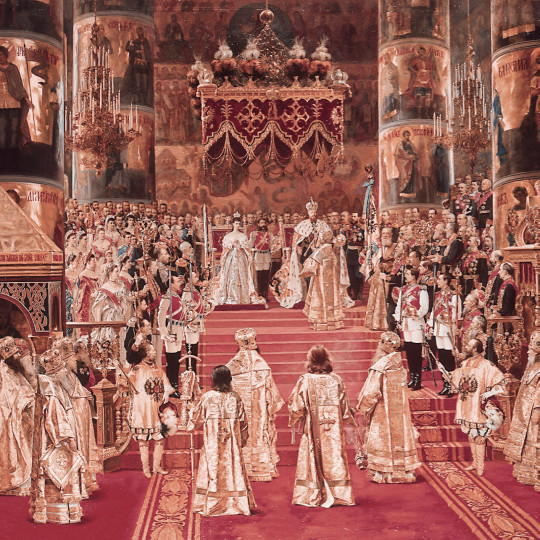

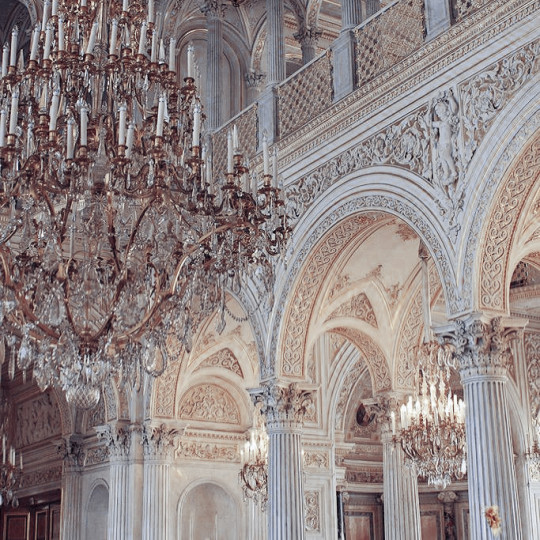


Russia! My astonished child's eyes see huge palaces, beautiful parks, fountains, gardens, amazing gatherings of relatives, military parades, religious services in churches glittering with gold, jewels so breathtaking you can hardly believe they are real [... ] My eyes also see long corridors, vestibules, and halls, of a size beyond compare, opening one into another, and our feet trotting timidly over wide stretches of floors, so unbounded and polished, that we seemed to walk on ice. And everywhere, a very characteristic smell: a mixture of turpentine, Russian leather and cigarette smoke, with a fragrance, unique in its own way, that distinguished the imperial palaces. Imperial is the right word, fantastic, like in fairy tales [...] every superlative is at its place in that Russia of the Tsars, that Russia full of splendour, which today is no more...
- Queen Marie of Romania, “Story of My Life”
#imperial russia#russian imperial family#tsarist russia#maria feodorovna#alexandra feodorovna#marie of romania#nicholas ii#tsar nicholas ii#otma#maria pavlovna the elder#grand duchess vladimir#grand duchess olga#grand duchess tatiana#grand duchess elizabeth feodorovna#grand duchess anastasia#olga romanova#tatiana romanov#maria romanov#anastasia nikolaevna#the romanovs#romanov family#romanov#romanov dynasty
482 notes
·
View notes
Text
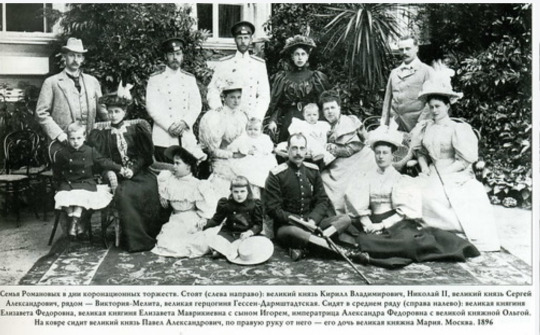
Romanov extended family group, 1896
Standing at the back from left to right: Ferdinand, Crowned Prince of Romania, Nicholas II, Grand Duke Sergei Alexandrovich, Princess Victoria Melita (standing very far from her husband, Ersnt Louis, Grand Duke of Hesse and By Rhine.)
Sitting in the middle row from left to right: The little boy still in skirts holding hands with the lady next to him, Marie, Crowned Princess of Romania, is Grand Duke Dmitry Pavlovich. Next to Marie is Empress Alexandra Feodorovna, holding her daughter Grand Duchess Olga Nikolaevna; next to her is Grand Duchess Marie Alexandrovna (I am using her original Russian title, she was also Duchess of Edinburg and eventually Grand Duchess of Saxe-Coburg Gotha.) I do not recognize the baby she is holding. Last, sitting in front of Ernie, is Grand Duchess Elizabeth Feodorovna.
On the floor, sitting by Marie and holding a little girl's hand, is one of Marie's younger sisters. The little girl whose hand she is holding is Grand Duchess Marie Pavlovna, the younger. Her father, Grand Duke Pavel Alexandrovich, is sitting next to her. Lastly, I am very tempted to say that the woman sitting to the right of Pavel is the elder Hessian sister, Victoria, although I am not 100% sure!
#russian history#romanov dynasty#imperial russia#empress alexandra feodorovna#nicholas ii#Grand Duke Sergei Alexandrovich#Grand Duke Pavel Alexandrovich#Grand Duchess Marie Alexandrovna#Grand Duchess Olga Nikolayevna#Grand Duchess Marie Pavlovna#Grand Duke Dmitry Pavlovich#Princess Victoria Melita#Ernst Louis#Ferdinand#Grand Duchess Elizabeth Feodorovna
8 notes
·
View notes
Note
Also a Russian article about Alexander and Olga Nikolaevna: (so that it would not be difficult for you, translation)
Speaking about the loves of Grand Duchess Olga Nikolaevna, it is impossible to ignore this one. Probably, it was a very short infatuation – maybe just a WILLINGNESS to fall in love – but it was this feeling that had every chance of getting continued. After all, Olga finally liked an equal in position: the prince of a foreign power.
In December 1913, Olga realized that her "sun" was Pavel Voronov (more?) he does not reciprocate her, and made several emotional entries about him in his diary, using a secret cipher. His behavior confuses and worries her, feelings are looking for a way out... on December 21, the denouement follows: "I found out that my S. is marrying Olga Kleinmichel. God send him happiness, my beloved S. It's hard. Sadly. He would be pleased." Olga also encrypted this entry. It would seem that the time has come to immerse yourself in experiences for a long time, but after a few weeks the mysterious cipher appears in the diary again. And if earlier he hid only declarations of love for Voronov, now Olga writes about something else (further encrypted fragments are italicized): "January 12. Alexander Serbian arrived (In Russian uniform. Wow, what eyes). January 15th. At 9:00, my Dad and Aunt and I went to St. Petersburg for the consecration of the new church of the Fedorovskaya Mother of God in honor of the 300th anniversary. It lasted from 10 to 1 ¼. Metropolitan, etc. A bright, large, good church. I was standing next to Alexander the Serbian, he was a little further away. Wow, wow what. January 17th. We had breakfast with Dad, Aunt, Kostya and Alexander. I sat with him. Cute, embarrassing and beautiful horror. Wow wow what. January 19th. Mom I don't know how. I fell asleep after 3 hours at night. God save her and everyone , and Alexander S. January 23. After in the Winter Courtyard. a big breakfast. Then we talked. I've been with Alexander for quite a long time. God save him. The 25th of January. We had breakfast with Papa, T. Olga, gr. Fredericks and Alexander S. He came to say goodbye. He's leaving in 2-3 days, it's a pity, dear."
Alexander Karageorgievich was 7 years older than Olga. He had a lot to do with Russia: he had Russian tutors, was the godson of Alexander III and the named son of Nicholas II; studied at the School of Jurisprudence and in the Page Corps in St. Petersburg. He became heir to the throne in 1909, after his elder brother George was forced to give up his rights to the throne under the pressure of a scandal. In the same year, Alexander almost asked for the hand of Princess Tatiana Konstantinovna. The Serbian minister and even the father-king personally made a cautious reconnaissance on this matter. But to the Konstantinovichs, the position of the Karageorgievich dynasty on the throne seemed too shaky. K.R., Tatiana's father, wrote in his diary: "I told her in detail about the claims of the Serbian court and about the reasons prompting us to advise her to refuse this offer. Although she rather likes Sandro Serbian, she did not hesitate to give him up." However, a year later the families still became related: Alexander's sister Elena married Grand Duke John Konstantinovich. For the Karageorgievichs, this was a great success, because they took the throne only in 1903 by a coup. In Europe, they were not really recognized, and not all Romanovs were disposed to them. In 1912-13, Alexander managed to show valor in the Balkan wars. And then he thought about getting married again, but now he was interested in the daughter of the tsar himself. ONLY WHICH ONE?
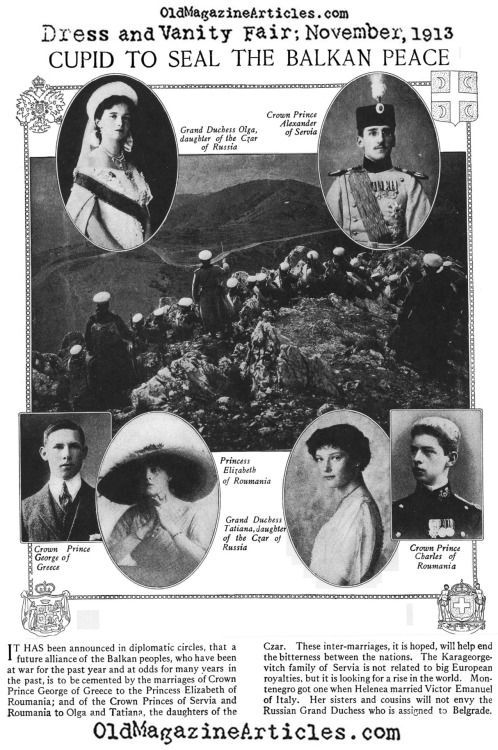
In this newspaper for November 1913, it was suggested that Olga would become the wife of Alexander of Serbia, and Tatiana – Karol of Romania. On the other hand, the English Wikipedia, with reference to Serbian archives, assures that Prime Minister Nikola Pasic wrote to Nicholas II in January 1914 about Alexander's intention to marry one of the Grand duchesses. Nikolai did not object and even noticed the interest that his daughter showed in the prince – but it was allegedly not Olga, but Tatiana. (And Russian Wikipedia generally assures: "Tatiana and Alexander wrote letters to each other until their death. When Alexander found out about Tatiana's murder, he was confused and almost committed suicide").Alexander's sister Elena, in her memoirs, which I have not yet been able to find, seemed to say that she noticed some "chemistry" between Alexander and Olga. Well, Olga's diary allows us to conclude that Alexander was not indifferent to her, and I think the Serbian heir himself paid attention to her. You can only guess what prevented you from taking the next step.In the spring, Olga is fond of Molokhovets, then the war begins, but all this does not prevent her from remembering Alexander on various occasions:"February 24.At 12 o'clock my mother received the Bavarian, Belgian, Danish and Serbian envoys (Nalajovic. So reminds Alexander C).February 25.(in small print: I haven't seen Alexander for a month since)March 25.I haven't seen Alexandra for 2 months. <...>(added, apparently, later) I haven 't seen Alexander S. for 2 months .September 4.The Pope gave Alexander of Serbia the St. George Cross 4 art . I am very happy. God help me.October 6.John, Gabriel and Kostya and Elena had lunch. They told me a lot of interesting things. She's a piece of Alexander, and I love her.October 16.At 7 o'clock we went to the infirmary with Mom, we went to everyone, and talked to K. and I. in the corridor. Everyone knows Alexander by his body."

Alexander was a thin brunette with a mustache and large facial features (and with "WOW" eyes) – this is exactly the type of appearance that has always attracted Olga. Besides, apparently, he was a really nice person. "The prince turned out to have a kind and friendly character," writes the grandson of his tutor, the famous priest Gleb Kaleda. "To please his tutor, the prince wrote to him in Russian, asking for forgiveness in advance for possible mistakes, although there were none." He was remembered as a tactful person, sometimes shy and prone to melancholy, a lover of reading – there is some similarity with Olga's character.Olga did not see Alexander again, but a year later she noted in her diary the anniversary of his arrival:"January 12, 1915.The year that I saw Alexander at Vsevolod's christening.January 15th.The year is consecrated. churches. Alexander.January 17th.Mordvinov and Count Fredericks were having breakfast. And a year ago Alexander. God bless him."It seems that even in the spring of 1916, Pasic expressed the hope that Olga would become the Serbian queen. But in January of this year, the date of the meeting with Alexander was not noted in the diary. At this time, Olga hardly thought about anyone other than Dmitry Shah-Bagov. (By the way, here her fate again intersects with the fate of Tatiana Konstantinovna, who was very friendly with the elder daughters of Nicholas II. Instead of the Serbian prince, she married a simple Caucasian officer for love, and he even served in the Erivan regiment – like Olga's lover. Because She even knew Shah Bagov and calls him a "cute, cute boy" in a letter. Surely Olga was thinking about what could repeat her path).But in 1917 Olga remembers again:"January 17th. Exactly 3 years ago today Alexander Serbsky had breakfast with us." Here the name is also written in cipher, and this is the last encrypted entry in the diary.
Olga Nikolaevna's biographers like to repeat that she wanted to stay in Russia, so she did not marry the Romanian heir Karol. The interest in Alexander the Serbian shows that, most likely, it was not in the country: it was just Karol who was unsympathetic to Olga. I think she understood that sooner or later she would have to leave her homeland. It is unlikely that the rumors had passed her by, she knew who her husbands were supposed to be, and she did not mind falling in love with a cute Orthodox prince. Maybe by the beginning of 17, she returned to thinking about him because someone had dispelled her hopes for a happy morganatic marriage? Although what could be a wedding when the revolution is already at the threshold. What kind of fate would await her in a small semi-literate kingdom, forever torn apart from the outside and from the inside?Alexander married in 1922 the sister of the same Karol (there is a version that he dragged on for so long, because until then he did not believe in the death of Olga). It seems that he became a good family man, ruled his country for more than 10 difficult years. Yugoslavia in the 20s became a fragment of the Russian Atlantis, the center of white emigration. Sometimes there is an opinion that Alexander was so supportive of Russian refugees in memory of his first love – "Olga/Tatiana." But I think Russia meant a lot to him anyway. Alexander was killed in 1934 by a terrorist, his family fled the Nazis during the war and never returned to their homeland. Well, instead of Maria, Olga could become a Romanian widow and exile… No matter how her fate turned out, it would not be easy. The time of the Slavic monarchs has passed.
Thank you for sharing!!
27 notes
·
View notes
Text
There is a popular quote attributed to Princess Xenia Georgievna about Grand Duchess Anastasia Nikolaevna, claiming that she was “‘frightfully temperamental,” “wild and rough”, and "cheated at games, kicked, scratched, pulled hair, and generally knew how to make herself obnoxious" - yet the letters between Xenia and Anastasia suggest they had a good, familial relationship - so, where did it come from?
Turn to Peter Kurth's book 'Anastasia: the life of Anna Anderson' - the title alone should give a hint at the context behind this quote! Page 202 states that:
"Although Xenia and [sister] Nina had left Russia in 1914, passing the war years with their mother in England, they both retained vivid memories of their “‘frightfully temperamental,” “wild and rough” cousin Anastasia, who cheated at games, kicked, scratched, pulled hair, and generally knew how to make herself obnoxious. “‘Anastasia was madly jealous of me because I was taller than she was,” Princess Nina recalled. “As the daughter of the Emperor she thought she ought by rights to tower over everyone.”"
So, one riddle is already solved: the much quoted note about Anastasia cheating "at games, kicked, scratched, pulled hair..." etc was not said directly by Xenia Georgievna, but rather was Kurth's interpretation and paraphrasing.
Kurth cites two sources here: the first, for Xenia, as being one of the two trials surrounding Anna Anderson in Hamburg. Hence, the quotes came from Xenia Georgievna's testimony to the court. The second, for Nina claiming that Anastasia was "madly jealous" because of her height is noted as coming from an "Interview with Princess Paul Chavchavadze (Princess Nina)" - Peter Kurth's own interview with Nina Georgievna.
Let's look closely at these two quotes.
Xenia's, saying that Anastasia was "wild and rough", came directly from a court setting, a legal testimony. As someone who knew Anastasia growing up, her opinion over the Anna Anderson affair would have been one of great interest. It's therefore quite likely that, in illustrating their apparent closeness as children to the extent that Xenia knew Anastasia's "wild" side, she was more reliable as a witness. This, of course, neglects to mention that Xenia and her sister departed Russia with their mother in 1914. They never got to see Anastasia mature into a teenager, whilst her tutors, close family, and entourage did - and they unanimously agreed that Anna Anderson could not have been Anastasia.
Similarly, Nina's quote about Anastasia's jealousy over her height appears to be somewhat accurate - Anastasia was indeed self-conscious about her height, writing in a letter to her father that she was very pleased to discover that she was taller than an officer that the sisters met. However, it also appears to be somewhat exaggerative.
For a more balanced perspective of Xenia and Nina, when they left Russia in 1914, they never saw their father again. He was shot by the Bolsheviks in 1919. No amount of money, status, or lavish upbringing can bring back a loved one: I don't think that it would be too drastic to say that, having lost her father to the Revolution, she was hopeful that there could be some hope that someone in their family might have escaped. Xenia, the younger child, just eleven years old when she saw her father for the last time, was unable to convince her elder sister that Anna Anderson was Anastasia.
Photo, left to right: Nina Georgievna, Anastasia Nikolaevna, Alexei Nikolaevich, Olga Nikolaevna, Tatiana Nikolaevna, Xenia Georgievna, Maria Nikolaevna
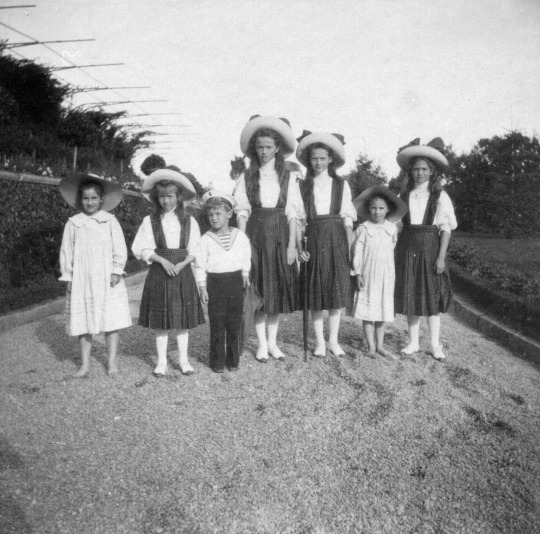
#Anastasia Nikolaevna#Anastasia Romanov#Anna Anderson#Nina Georgievna#Xenia Georgievna#Nina Romanov#Xenia Romanov#quotes#sources#Peter Kurth#cousins
34 notes
·
View notes